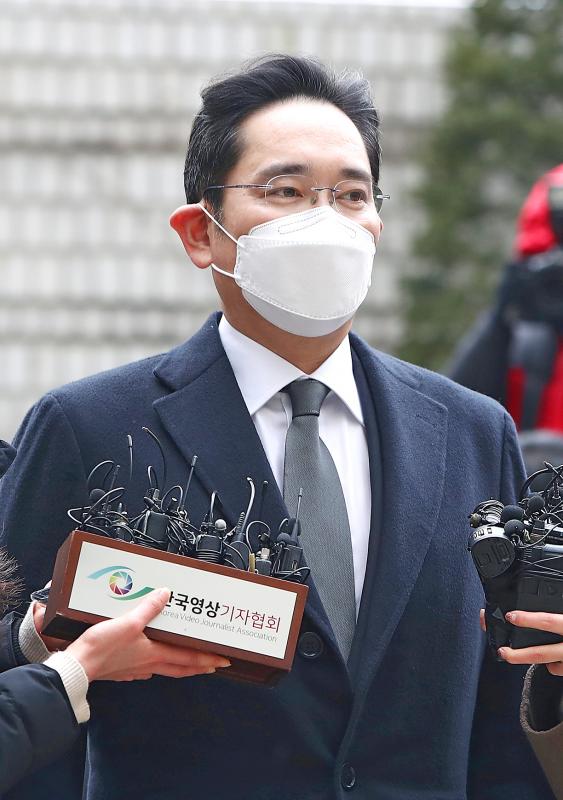The de facto chief of South Korea’s Samsung business empire was yesterday convicted over a huge corruption scandal and jailed for two-and-a-half years, in a ruling that deprives the tech giant of its top decisionmaker.
Jay Y. Lee, vice chairman of Samsung Electronics Co, the world’s biggest smartphone and memorychip maker, was found guilty of bribery and embezzlement in connection with the scandal that brought down former South Korean president Park Geun-hye.
Lee “actively provided bribes and implicitly asked the president to use her power to help his smooth succession” at the head of the sprawling conglomerate, the Seoul Central District Court said in its verdict.

Photo: EPA-EFE
“It is very unfortunate that Samsung, the country’s top company and proud global innovator, is repeatedly involved in crimes whenever there is a change in political power,” it said.
It concluded a retrial that was the latest step in a long-running legal process that has hung over Samsung for years.
The multibillionaire Lee — who had earlier walked into court grim-faced and wearing a mask, without responding to reporters’ shouted questions — was immediately taken into custody.
He has effectively been at the head of the Samsung Group for several years after his father was left bedridden by a heart attack, finally dying in October.
“This is essentially a case where the freedom and property rights of a company were violated by the former president’s abuse of power,” Lee’s lawyer, Lee In-jae, told reporters.
“Given the nature of the matter, I find the court’s ruling regrettable,” he said.
Experts say the sentence would create a leadership vacuum that could hamper Samsung’s decisionmaking on large-scale investments.
“It’s really a huge blow and a big crisis for Samsung,” said Kim Dae-jong, a business professor at Sejong University.
Samsung Electronics, the group’s flagship subsidiary, declined to comment on the ruling.
“Considering Samsung’s share of the [South] Korean economy and its status as a global company, the ruling is feared to have a negative impact on the overall [South] Korean economy,” the Federation of Korean Industries said in a statement.

Right-wing political scientist Laura Fernandez on Sunday won Costa Rica’s presidential election by a landslide, after promising to crack down on rising violence linked to the cocaine trade. Fernandez’s nearest rival, economist Alvaro Ramos, conceded defeat as results showed the ruling party far exceeding the threshold of 40 percent needed to avoid a runoff. With 94 percent of polling stations counted, the political heir of outgoing Costa Rican President Rodrigo Chaves had captured 48.3 percent of the vote compared with Ramos’ 33.4 percent, the Supreme Electoral Tribunal said. As soon as the first results were announced, members of Fernandez’s Sovereign People’s Party

MORE RESPONSIBILITY: Draftees would be expected to fight alongside professional soldiers, likely requiring the transformation of some training brigades into combat units The armed forces are to start incorporating new conscripts into combined arms brigades this year to enhance combat readiness, the Executive Yuan’s latest policy report said. The new policy would affect Taiwanese men entering the military for their compulsory service, which was extended to one year under reforms by then-president Tsai Ing-wen (蔡英文) in 2022. The conscripts would be trained to operate machine guns, uncrewed aerial vehicles, anti-tank guided missile launchers and Stinger air defense systems, the report said, adding that the basic training would be lengthened to eight weeks. After basic training, conscripts would be sorted into infantry battalions that would take

GROWING AMBITIONS: The scale and tempo of the operations show that the Strait has become the core theater for China to expand its security interests, the report said Chinese military aircraft incursions around Taiwan have surged nearly 15-fold over the past five years, according to a report released yesterday by the Democratic Progressive Party’s (DPP) Department of China Affairs. Sorties in the Taiwan Strait were previously irregular, totaling 380 in 2020, but have since evolved into routine operations, the report showed. “This demonstrates that the Taiwan Strait has become both the starting point and testing ground for Beijing’s expansionist ambitions,” it said. Driven by military expansionism, China is systematically pursuing actions aimed at altering the regional “status quo,” the department said, adding that Taiwan represents the most critical link in China’s

EMERGING FIELDS: The Chinese president said that the two countries would explore cooperation in green technology, the digital economy and artificial intelligence Chinese President Xi Jinping (習近平) yesterday called for an “equal and orderly multipolar world” in the face of “unilateral bullying,” in an apparent jab at the US. Xi was speaking during talks in Beijing with Uruguayan President Yamandu Orsi, the first South American leader to visit China since US special forces captured then-Venezuelan president Nicolas Maduro last month — an operation that Beijing condemned as a violation of sovereignty. Orsi follows a slew of leaders to have visited China seeking to boost ties with the world’s second-largest economy to hedge against US President Donald Trump’s increasingly unpredictable administration. “The international situation is fraught